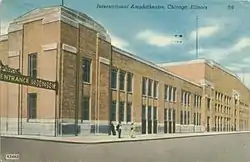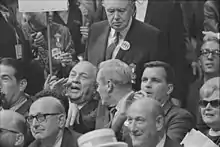International Amphitheatre
The International Amphitheatre was an indoor arena located in Chicago, Illinois, that opened in 1934 and was demolished in 1999. It was located on the west side of Halsted Street, at 42nd Street, on the city's south side, in the Canaryville neighborhood, adjacent to the Union Stock Yards.
 A postcard of the venue from 1953 | |
| Address | 4220 South Halsted Street Chicago, Illinois 60609 United States |
|---|---|
| Coordinates | 41°48′58″N 87°38′46″W[1] |
| Owner | Union Stock Yard and Transit Company (until 1983) |
| Capacity | 9,000 |
| Construction | |
| Opened | December 1, 1934[2] |
| Closed | 1999 |
| Demolished | August 3, 1999 (began) |
| Construction cost | $1.5 million ($32.8 million in 2022 dollars[3]) |
| Architect | Abraham Epstein[2][4] |
| Tenants | |
| Chicago American Gears (NBL/PBLA) (1944–1948) Chicago Packers (NBA) (1961–1962) Chicago Majors (ABL) (1961–1963) Chicago Bulls (NBA) (1966–1967) Chicago Cougars (WHA) (1972–1975) Chicago Sting (NASL) (1976) Loyola Ramblers basketball (NCAA D-I) (1987–1989) | |
History

The venue opened on November 30, 1934.[5] It had been built for $1.5 million by the Stock Yard company and was principally built to host the International Livestock Exhibition.[5][2] The arena replaced Dexter Park, a horse-racing track that had stood on the site for over 50 years until its destruction by fire on April 18, 1934.[2] The completion of the Amphitheatre ushered in an era where Chicago reigned as a convention capital. In an era before air conditioning and space for the press and broadcast media were commonplace, the International Amphitheatre was among the first arenas to be equipped with these innovations.
The Stock Yards closed in 1971, but the Amphitheatre remained open,[5] hosting rock concerts, college basketball and IHSA playoff games, circuses, religious gatherings, and other events. The shift of many conventions and trade shows to the more modern and more conveniently-located lakefront McCormick Place convention center, during the 1960s and 1970s, began the International Amphitheatre's decline, which continued with the opening of other convention and concert venues in the suburbs drawing more events away. By the 1980s, the venue was struggling due to competition from large facilities such as the Chicago Stadium, Rosemont Horizon, Arie Crown Theater, Alpine Valley Music Theatre, Holiday Star Theatre, UIC Pavilion, and the renovated Chicago Theatre.[5]
In the late 1970s, developer Harry Chaddick proposed replacing the arena with a large shopping center, but these plans were killed after Mayor Michael Bilandic revoked his support for the project after residents and politicians of the Canaryville and Bridgeport neighborhoods complained that such a development would attract both intense vehicular traffic and draw over the residents from nearby Chicago Housing Authority projects.[5]
After an automobile swap show in March 1983, the venue closed its doors. This was widely seen as an end for the venue. It was sold to new ownership for a mere $250,000 and sat dormant for three years. During plans were floated to convert the venue into a sound stage.[5] However, on November 28, 1987, the Chicago Amphitheater reopened with a game by the Loyola Ramblers college basketball team, who became tenants of the reopened Amphitheatre. Some repairs and improvements had been made to the facility.[5][6] A greater $5 million renovation was planned at the time of its reopening, and it was intended that Loyola basketball would remain tenants of the venue for at least five years.[6] However, for their 1989 season, Loyola had moved to the Rosemont Horizon after the Amphitheatre proved to be an unsatisfactory home venue to the team. The team had faced attendance as low as 500 spectators while playing at the facility.[7]
The sprawling venue was difficult to maintain and struggled to attract enough large events to pay for its own upkeep. It was eventually sold to promoters Cardenas & Fernandez and then the City of Chicago, which had no more success at attracting events than its previous owner. In August 1999, demolition of the International Amphitheatre began.[8] An Aramark Uniform Services plant is located on the site once occupied by the Amphitheatre.
Events and tenants
The original primary purpose of the arena was to host the North American International Livestock Exposition. This event would be held at the arena until several years after the Union Stock Yards closed in July 1971, when it left for Louisville, Kentucky.[5][2]
Presidential nominating conventions

The Amphitheatre hosted several national American presidential nominating conventions:
- 1952 Republican National Convention (nominated Dwight D. Eisenhower for President and Richard M. Nixon for Vice President; ticket won)
- 1952 Democratic National Convention (nominated Adlai E. Stevenson for President and John J. Sparkman for Vice President; ticket lost)
- 1956 Democratic National Convention (nominated Adlai E. Stevenson for President and Estes Kefauver for Vice President; ticket lost)
- 1960 Republican National Convention (nominated Richard M. Nixon for President and Henry Cabot Lodge Jr. for Vice President; ticket lost)
- 1968 Democratic National Convention (nominated Hubert H. Humphrey for President and Edmund S. Muskie for Vice President; ticket lost)
The 1952 Republican National Convention had the distinction of being the first political convention broadcast live by television coast to coast, with special studio facilities provided for all the major networks.[9]
The 1968 Democratic National Convention was one of the most tumultuous political conventions in American history, noted by anti-war protests.
Sports
Televised boxing and wrestling events were held at the venue for decades, making it a well-known venue across the United States.[5] In December 1981, Joe Frazier had his final boxing match at the Amphitheatre against Floyd Cummings, which resulted in a draw.
The arena, which seated 9,000, was the first home of the Chicago Packers of the NBA during 1961–62, before changing their name to the Chicago Zephyrs and moving to the Chicago Coliseum for their second season.[10] It was also the home of the Chicago Bulls during their inaugural season of 1966–67; they also played only one game in the Chicago Coliseum, a playoff game in their first season, as no other arena was available for a game versus the St. Louis Hawks. Afterwards, the Bulls then moved permanently to Chicago Stadium, where they remained until 1994, when they moved to their current home court at the United Center.
The Amphitheatre was also the primary home of the Chicago Cougars of the WHA from 1972 to 1975. It was originally intended to be only a temporary home for the Cougars, but the permanent solution, the Rosemont Horizon, was not completed until 1980, five years after the team folded and a year after the WHA ceased operation. The International Amphitheatre was the home for Chicago's wrestling scene for years as well as the Chicago Auto Show for approximately 20 years beginning in the 1940s.[11][8]
Strangely enough, on December 30, 1962 and January 5, 1964, the Chicago Amphitheatre hosted The Southside WinterNationals INDOOR Drag Races. With the smooth concrete floors, Drivers reported it was like racing on ICE. It was also reported that after the first races, cases of Coca Cola syrup were brought in, poured on the floor and allowed to dry overnight. Drivers like Arnie "The Farmer" Beswick, and Mr. Norm from Grand Spaulding Dodge later admitted the syrup did little to help traction. Staging was outside in the Chicago - January cold. Drivers did as many as 5 "burnouts" just to heat the rear tires. The shutdown area involved a sharp turn and wall that claimed more than a few of the entries.
On March 13–14, 1976, the Midwest Regional of the North American Soccer League's 1976 Indoor tournament was hosted by the Chicago Sting at the Amphitheater. The Rochester Lancers won the Region to advance to the Final Four played in Florida.[12]
The Loyola Ramblers basketball team were tenants of the venue during their 1987–88 and 1988–89 seasons,[5][7] but faced poor attendance at the aging facility.[7]
Concerts and entertainment
Notable performers who held shows at the venue included Dale Evans and Roy Rogers, Evel Knievel, The Rolling Stones, Frank Sinatra, Led Zeppelin, The Who, Pink Floyd, AC/DC, Black Sabbath, Ike & Tina Turner, Grateful Dead, Van Halen, Aerosmith, Selena and The Jackson 5.[5][13] The Amphitheatre is noted for being the site of one of Elvis Presley’s most notable concerts, on March 28, 1957, with the singer wearing his now legendary gold lame suit for the first time.[14] On September 5, 1964 and August 12, 1966, The Beatles performed at the Amphitheatre. The 1966 show was the first show of what proved to be their last tour.[15] For eighteen years, the arena was the site of Chicago visits by the Ringling Brothers and Barnum & Bailey Circus.[5] In October 1978, English rock group UFO recorded parts of what would become Strangers in the Night at the International Amphitheatre.
Gallery
.jpg.webp) Arena in 1948
Arena in 1948 1952 Republican National Convention
1952 Republican National Convention.JPG.webp) John F. Kennedy nominates Adlai Stevenson at the 1956 Democratic National Convention
John F. Kennedy nominates Adlai Stevenson at the 1956 Democratic National Convention Illinois delegates (including Richard M. Daley and Richard J. Daley) during the 1968 Democratic National Convention
Illinois delegates (including Richard M. Daley and Richard J. Daley) during the 1968 Democratic National Convention
References
- "International Amphitheater (historical)". Geographic Names Information System. United States Geological Survey, United States Department of the Interior. 15 January 1980.
- Abbott, Noel (19 May 2016). "Throwback Thursday – International Amphitheatre". Epstein Global. Retrieved 17 May 2021.
- 1634–1699: McCusker, J. J. (1997). How Much Is That in Real Money? A Historical Price Index for Use as a Deflator of Money Values in the Economy of the United States: Addenda et Corrigenda (PDF). American Antiquarian Society. 1700–1799: McCusker, J. J. (1992). How Much Is That in Real Money? A Historical Price Index for Use as a Deflator of Money Values in the Economy of the United States (PDF). American Antiquarian Society. 1800–present: Federal Reserve Bank of Minneapolis. "Consumer Price Index (estimate) 1800–". Retrieved May 28, 2023.
- "International Amphitheater". Electronic Encyclopedia of Chicago. Chicago Historical Society. 2005. Retrieved 17 May 2021.
- Davis, Robert (November 27, 1987). "Amphitheatre Comes Backc from Oblivion". Chicago Tribune. Retrieved 11 August 2022.
- Hanley, Reid (November 29, 1987). "Loyola Wins Amphitheatre Opener". Chicago Tribune. Retrieved 11 August 2022.
- Jauss, Bill (November 15, 1989). "Rey's small Ramblers face a big challenge". Chicago Tribune – via Newspapers.com.
- Boylan, Anthony Burke (May 30, 1999). "Amphitheatre Gets Its Final Curtain Call". Chicago Tribune. Retrieved 2016-02-03.
- "TV Goes to the Conventions". Popular Mechanics: 94–97. June 1952.
- Hareas, John. "A Colorful Tradition". Washington Wizards. Retrieved 2008-03-19.
- Tito, Rich (April 21, 2004). "Regional Territories-WWA Indianapolis". Kayfabe Memories. Retrieved 2016-02-03.
- Milbert, Neil (March 13, 1976). "Opener for the Sting tonight". Chicago Tribune. p. 5, Section 2.
- "International Amphitheatre". WTTW Chicago. 25 November 2013. Retrieved 11 August 2022.
- Cora, Casey (January 8, 2015). "Elvis in Chicago Was 'Electrifying': An 80th Birthday Celebration". DNAinfo.com. Archived from the original on March 16, 2016.
- "Live: International Amphitheatre, Chicago". The Beatles Bible. 5 September 1964. Retrieved 2016-02-03.
External links
- International Amphitheatre article in the Encyclopedia of Chicago
- International Amphitheatre at WTTW
| Events and tenants | ||
|---|---|---|
| Preceded by first arena |
Home of the Chicago Packers 1961–1962 |
Succeeded by |
| Preceded by first arena |
Home of the Chicago Bulls 1966–1967 |
Succeeded by |